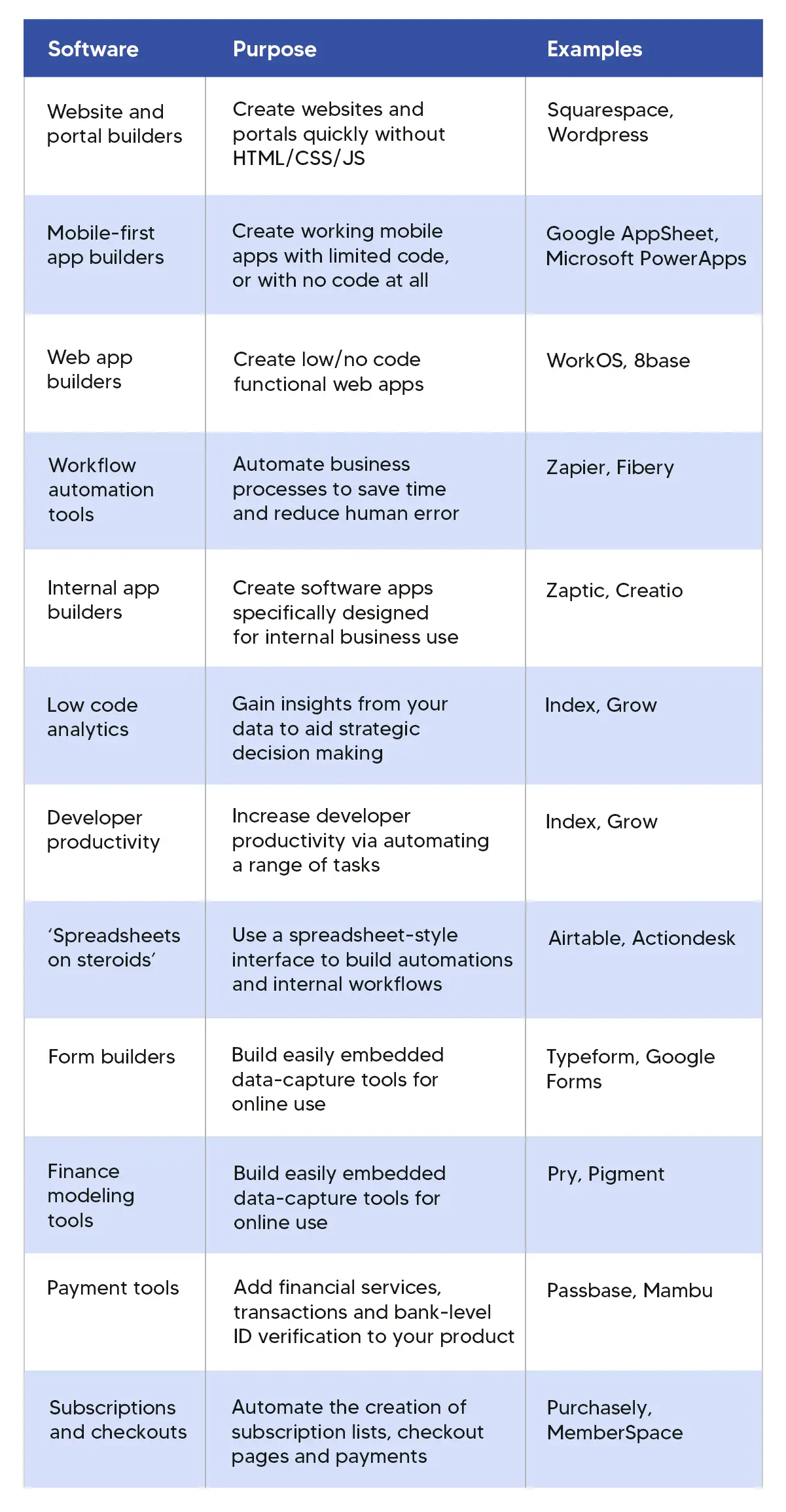Other recent blogs



Let's talk
Reach out, we'd love to hear from you!
As digitization accelerates, low-code solutions are a fast and flexible alternative to the traditional development cycle.
Companies’ discussion of low-code solutions grew 18% year on year in 2022 to cut down development times and meet pressing business needs near immediately.

Yet whilst low-code solutions are cost-effective, fast and adaptable, they work significantly better for some tasks than others. Typically, businesses find most use for them in the following areas:
- Setting up the basics and testing new product ideas
- Building internal apps and automating a range of business processes
- Freeing up developers and other employees from repetitive work
Below, we lay out what low-code solutions are, what they can achieve and how to use them effectively as a growth tool for your business.
What is low-code development?
low-code application development platforms allow people with limited to no development knowledge to create software applications, usually via a Graphical User Interface (GUI).
Some low-code platforms can be used with no development knowledge at all. These are also known as ‘no code’ solutions – such as website builders like Squarespace, Wordpress and Wix.
Other low-code mobile app development solutions require a basic level of coding knowledge to use or are designed to improve developer productivity, such as Chartio or Canonic.
A final category can be used without code but enhanced by coding knowledge or a heavier application of systems-based thinking, for example workflow automation tools like Zapier, or low-code analytics platforms.
All three categories fall under the low-code umbrella – you may see this referred to as ‘low-code no code’ or ‘LCNC’ elsewhere.
What can you build with low-code development?
low-code development can be used for a wide range of tasks, from automating repetitive development work (and giving your team time back) to building entire websites or software apps.
A recent in-depth survey of the low-code market identified 12 key industry verticals, each with a specific use case:

What benefits do low-code solutions offer your business?
Overall, low-code solutions offer the following advantages over the traditional development cycle:
- Cost: low-code application development tools are cheaper than hiring developers full time, or outsourcing to a development agency.
- Speed: workflow automation tools like Zapier can save weeks compared to extensive customization, and your employees become more productive as a result.
- Democratization: With low-code mobile app development solutions, good ideas can come from anyone, not just those with extensive coding knowledge.
- Cloud hosting: low-code solutions are largely cloud-based, so you can reap the benefits of cloud-based hosting without a complex, time-consuming migration.
- Agility: low-code application development allows your business to be more reactive. Your teams can make efficiency improvements without coding expertise and release new MVPs more quickly.
Using low-code solutions, businesses can digitize quickly without significant upfront expenditure, increasing business agility and streamlining workloads for increased productivity.
low-code’s benefits are rapidly extending beyond internal use cases. A recent survey by Statista suggests that app builders Microsoft Power Apps and Google AppSheet were the most used low-code solutions in 2022. Building external-facing apps using low-code solutions is an ideal way to:
- Reacting quickly to external stimuli, particularly in unpredictable economic landscapes
- Demonstrate an app idea to new investors
- Build basic customer-facing websites and apps as a startup
- Pivot quickly to shift product-market fit
5 best low-code development platforms to use in 2024
According to Allied Market Research, “The global low-code development platform market was valued at $11.5 billion in 2021 and is projected to reach $125.6 billion by 2031, growing at a CAGR of 27.4% from 2022 to 2031.”
The market for low-code technology solutions has exploded in the past few years. The global pandemic further contributed to the increased demand for low-code solutions as businesses aggressively prioritized automation and digital transformation initiatives to enable their workforces and customers. Currently, the market has become way more crowded with hundreds of solutions/platforms that help streamline workflows and accelerate automation projects. However, to simplify the decision-making process for you, we asked our experts, and they recommended the following 5 platforms:
OutSystems: OutSystems is one of the most talked about low-code development platforms in the market. Harnessed the right way, it can equip your teams with rapid application development capabilities. It comes embedded with a visual development environment and extensive integration options, which simplifies and accelerates the process of web and mobile application development.
Microsoft Power Apps: It is an industry-grade application development platform designed to accelerate the entire software development cycle while significantly reducing dependency on traditional IT teams. However, what truly distinguishes Power Apps from the rest of the low-code platforms is its seamless connectivity with the rest of Microsoft's ecosystem, such as Office 365 and Azure; this makes this platform a great choice for teams and companies invested in Microsoft products.
Appian: Appian is a low-code automation platform focused on workflow automation and business process management (BPM). It offers a unified platform for designing, executing, and optimizing business processes, making it a comprehensive solution for organizations looking to streamline their operations and improve efficiency.
Mendix: Mendix is one of the most user-friendly low-code development tools emphasizing collaboration between developers and business users. It provides pre-built widgets and connectors to accelerate app development. Known for its flexibility and scalability, Mendix enables organizations to build applications that can adapt and grow with evolving business needs.
Hooper: Hooper is a next-generation platform designed for rapid application development and process automation. Its innovative features and initiative interface make it accessible to a wide range of business and IT users. The platform supports multi-platform application development, including web and mobile, and thus supercharges a team’s capabilities to rapidly digitize its digital core while reducing the need for developer intervention.
Hooper has a global clientele and can prove immensely useful in helping businesses execute strategies and processes with rapid application development (RAD). By strategically leveraging the transformative potential of Hooper, your business will be able to eliminate productivity bottlenecks and design workflows with a highly intuitive ‘drag and drop’ based visual designer.
At Kellton, we were so impressed with its potential to transform businesses and drive digital transformation across the enterprise that we decided to enter into a strategic partnership with the Hooper team. We are confident that the synergy from the joint collaboration will help our clients drive more profound business outcomes.
Note: Read more about the strategic partnership between Kellton and Hooper Labs.
What you should bear in mind when using low-code solutions
To make the most of low-code application development tools, you need to know their limitations as well as their strengths. Whilst low-code solutions offer a high level of agility at a low cost point, they fall short in two crucial areas:
- Security: software engineers and developers know how to build security into apps to mitigate risks from cyberattacks. Non-developers building apps with low-code solutions lack this knowledge and could inadvertently create an app with vulnerabilities.
- Functionality: low-code solutions won’t offer standout functionality and can be difficult to scale. If market leadership in this area is strategically important to your business, low-code solutions may hold you back – particularly for customer-facing uses.
Using low-code solutions where extended functionality or higher levels of security are required builds a degree of technical debt into your business. Whilst low-code saves you money in the short term, it can stunt long-term growth if not upgraded or replaced at the right time.
A few final thoughts
Ultimately, your business should care about low-code development because
- You can digitize quickly, automate key processes and save employees time
- You can test out new ideas without large costs and development timescales
- You can democratize the technical side of your business for idea generation
- You can facilitate a cloud migration with low-code solutions
These advantages make low-code development a hugely important tool for business agility. You can react to business needs, build, test and adjust near instantaneously compared to full-scale customized development.
Equally, as you grow, develop your ideas and cast your eyes on market leading functionality, you might find you start to outgrow low-code platforms. For example, whilst you might use a website builder to create an MVP, you will start to find the tool lacking as you add more complex, interactive features.
If you want to take the next step and turn your low-code solutions into something more powerful, a third-party development agency offers unparalleled access to top-tier tech talent from around the globe.
At Kellton, we scale teams of experts based on your project’s specific needs across a range of services. Whether you’re looking for input on internal data engineering, agile enterprise or full-scale web and app development, we have the expertise you need.
Recommended Reading: Mobile App Development: An essential guide for business executives



